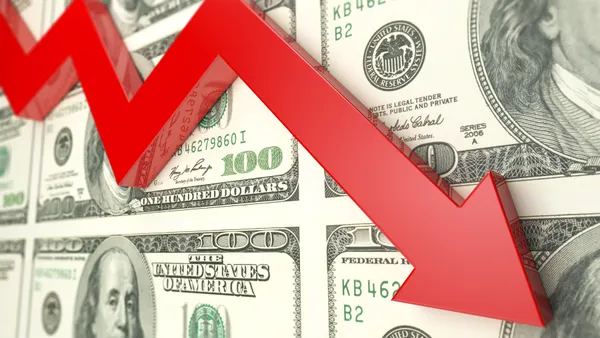Dive Brief:
- Nearly half of small- and medium-sized enterprises worldwide (48%) believe that their peers during the past decade have become more willing to distort financial statements to hide fraud and other corruption, according to the Association of Chartered Accountants.
- Roughly three out of five SMEs believe their counterparts are likely to face a risk of bribery and other corruption, the ACCA found in its global survey, while the same proportion believe challenging such wrongdoing will harm their trade and other opportunities.
- “Corruption is a poison — it distorts markets, stunts economic growth and deters investment,” Jillian Couse, head of ACCA North America, said in a statement.
Dive Insight:
The U.S. has made little progress combating corruption since 2021, according to Transparency International, which last year ranked 180 countries and territories by their perceived levels of public sector corruption.
The U.S. for the second consecutive year scored 69 out of a scale of 100 — with 100 being “clean” of malfeasance — based on factors such as bribery, diversion of public funds, prosecution of corrupt officials and the use of public office for private gain, Transparency International said when releasing its Corruption Perceptions Index in January.
“The stagnant U.S. score reflects a continuing struggle for progress on anti-corruption measures that can protect our democratic processes and institutions,” Transparency International said, noting that U.S. citizens believe that their wealthy counterparts “buy” elections more easily than in any other developed country.
The ACCA findings suggest that corruption is apparently more veiled than five years ago. Compared with a 2019 survey, the owners of SMEs and their financial advisors worldwide currently say they have greater difficulty identifying wrongdoing in contract-related consultancy or facilitation fees and in invitations to corporate hospitality.
The offer of gifts or payments not related to services and the suggestion of special treatment by regulatory officials are also more difficult to bring to light compared with five years ago, according to ACCA findings.
At the same time, among markets subject to bribery and corruption, the owners of SMEs and their financial advisors believe that they are more likely than in 2019 to see malfeasance in dealing with public sector officials and when negotiating contracts for cross-border trade in goods and services, according to ACCA survey results.
Wrongdoing is also more prevalent than in 2019 in negotiations over private sector contracts and as a result of supply chain pressures, according to respondents to the ACCA survey.
“Many small businesses don't have the bargaining power to refuse when small bribes are demanded of them,” the ACCA said. “Entrepreneurs have to choose between paying the bribe or losing the business — and often that is no choice at all for someone trying to support a family.”
London-based ACCA has 247,000 members in 181 countries.
















